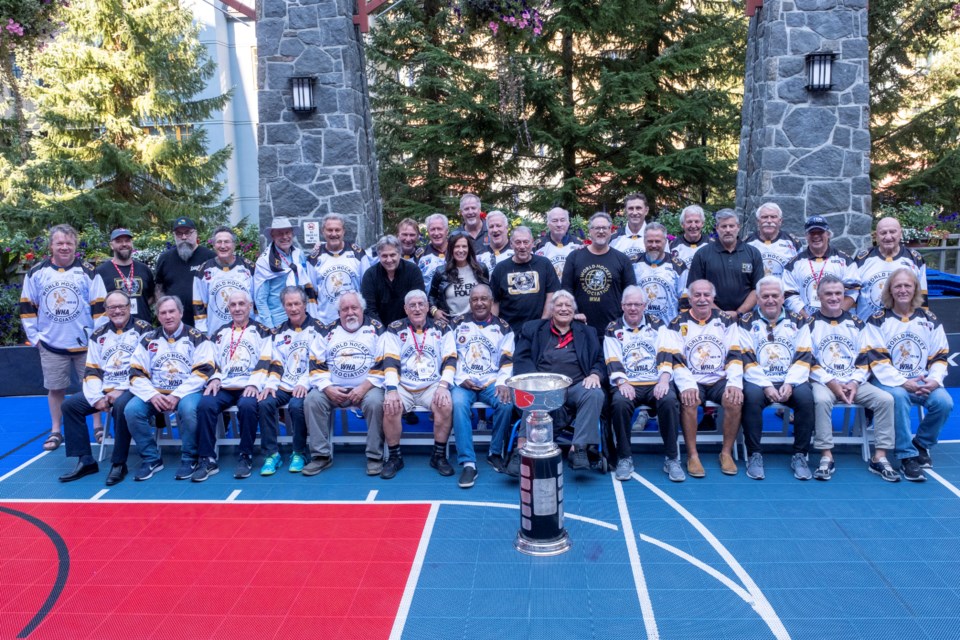A score of hockey legends and fans descended on Whistler this Thanksgiving weekend to celebrate the 50th anniversary of the WHA.
If you’re currently assuming that acronym stands for the Whistler Hockey Association, you’re wrong. (That would be the Whistler Minor Hockey Association, or the WMHA. That organization still has a couple of decades to go until it hits the half-century milestone.)
As some hockey history buffs might have already picked up, this weekend’s festivities instead honoured the World Hockey Association, a league that boldly burst onto the North American professional sports scene in the 1970s.
The WHA Preservation Alliance (WHAPA) hosted the 50th anniversary reunion in Whistler from Oct. 6 to 10. Originally, said WHAPA reunion committee co-chair Greg Beaudin, the intent was to host a tribute to the 1976 WHA championship-winning Winnipeg Jets squad that his dad, Norm, played on.
“We were looking at the calendars, and then we said, ‘Well, maybe we should not be thinking about a team party, but a league party,’” Beaudin explained. Once organizers realized it was the WHA’s 50th, “We were like, ‘let’s do it.’”
The group considered a variety of “neutral” locations to host the event, but Whistler—or “Canada’s playground for adults,” as Beaudin described it—ultimately proved to be the perfect choice, he added.
After about 18 months of planning, “It was surreal to see the alumni walking around the village with their commemorative jerseys; going from Buffalo Bills to Longhorn to the Westin to the Delta, at the Chateau Whistler Golf Club,” said Beaudin. “It was exactly how we envisioned it.”
Though its seven-year lifespan was brief, the WHA made waves as the first modern league to put up a real fight against the National Hockey League (NHL), attracting a comparable level of talent and planting roots that carry through to today.
The league launched in 1972 with higher salaries and less restrictive contracts that motivated 67 NHL players to make the jump, led by legendary Chicago Black Hawk Bobby Hull. The WHA was also where then- 17-year-old Wayne Gretzky, in 1978, began his pro career with the Indianapolis Racers before moving to the Edmonton Oilers after only eight games.
The WHA culminated with the NHL’s 1979 expansion—commonly but incorrectly referred to as the NHL-WHA merger. It resulted in four of the WHA’s six remaining teams—the Edmonton Oilers, New England (later Hartford) Whalers, Quebec Nordiques and Winnipeg Jets—joining the NHL ahead of the 1979-80 season.
Without the influence of the WHA, “the NHL wouldn’t be what it is today,” said Beaudin, from contracts to international talent to the sport’s growth in the southern United States.
“The WHA changed the whole salary dynamic for current players, since Bobby Hull challenged the NHL establishment to stop the owners of NHL teams from ... paying the players peanuts. When they opened up the wallets it became more of a free-market system, and it turned this sport of hockey into more of an international game,” Beaudin explained.
“That was the beauty of the WHA, and that’s why it needs to be celebrated continuously, is because it was a huge, important part of hockey as we know it today.”
In addition to a public festival plaza in front of the Westin (complete with a ball hockey court and tournament), the weekend’s festivities included a celebrity golf tournament, an “emotional” legacy dinner, as Beaudin described it, honouring WHA stars like Hull, Andre Lacroix, Dennis Murphy, Garnet “Ace” Bailey, the Howe family, and Swedes Anders Hedberg and Ulf Nilsson, to name just a few, plus a tribute to Alton White—the second-ever Black professional major league hockey player, and the WHA’s first.
Organizers were even inspired to bring more of these portable ball hockey events to Whistler, Beaudin added. “I mean, we had kids playing and we had we had 80-year-old alumni playing,” he said. “That style of community hockey is so perfect for Whistler. We wanted to showcase it with this with this reunion, as a sort of a template moving forward, to keep it going.”
Another item on the itinerary was a Slap Shot reunion screening at Buffalo Bills in honour of the cult film’s 45th anniversary. The movie, starring Paul Newman, has a few real-life links with the WHA: Slap Shot’s fictional Hanson brothers were based on real-life hockey players Jeff, Steve and Jack Carlson.
Edmonton Oiler Jack Carlson was cast to play Jack Hanson, while fellow WHA alum David Hanson was originally tapped to play the character based on him, “Dave ‘Killer’ Carlson.” But before cameras started rolling, the Oilers made the WHA playoffs, putting an end to Jack Carlson’s involvement. Dave Hanson was recast as “Jack Hanson,” while actor Jerry Houser was brought in to play “Killer.”
Hanson himself was on hand for the Whistler reunion, alongside Allan Nicholls, who played Charlestown Chiefs captain Johnny Upton.
“All the alumni are texting me, saying how much fun they had; what a great setup it was. The whole experience, I think was wonderful and everyone’s really happy with the way it unfolded,” said Beaudin. “These players and the way we crafted this Whistler weekend, it all made them feel special, and they all had a great time.”
The event wasn’t purely nostalgic: the reunion also raised about $20,000 for the Bobby Hull Foundation for Children, and is set to raise about the same for the Leukemia and Lymphoma Society of Canada and non-profit Stop Concussions once online sales of signed commemorative jerseys and other merchandise is completed. Head to wha1972.com to peruse that memorabilia for yourself.




